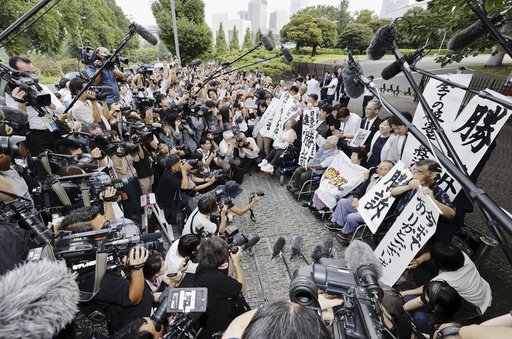In a significant ruling, Japan’s Supreme Court has directed the government to provide appropriate compensation to roughly a dozen individuals who were involuntarily sterilized under the defunct Eugenics Protection Law, which aimed to prevent the birth of offspring from individuals with disabilities.
It is estimated that around 25,000 people underwent sterilization without consent between the 1950s and 1970s under the law that sought to avoid the birth of what it termed as “poor-quality descendants.” The plaintiffs’ legal representatives labeled this law as the most significant human rights violation in post-World War II Japan.
The Supreme Court deemed the 1948 eugenics law as unconstitutional and dismissed the government’s argument that a 20-year statute of limitations should absolve it from providing compensation.
Wednesday’s ruling specifically pertained to 11 out of the 39 plaintiffs who had taken legal action in various lower courts across Japan to have their case heard by the top court. Cases involving the remaining litigants are currently pending.
Following the ruling, the plaintiffs, some of whom use wheelchairs, displayed signs expressing gratitude and victory outside the court. An 81-year-old plaintiff using the pseudonym Saburo Kita stated that he was sterilized at the age of 14 in 1957, impacting his ability to have children.
The court, through Judge Saburo Tokura, concluded that the sterilization procedures lacked rational justification and were a form of discrimination against the plaintiffs due to their disabilities. The court highlighted the severe violation of their dignity and condemned the government’s continuous discrimination and violation of human rights over 48 years.
Despite the government offering a one-time compensation payment of 3.2 million yen ($19,800) to each plaintiff in 2019 following lower court rulings, the Supreme Court on Wednesday stated this compensation was inadequate.
Prime Minister Fumio Kishida conveyed a “sincere regret and heartfelt apology” to the victims, expressing a desire to personally apologize to them. The government intends to explore a new compensation arrangement.
The plaintiffs’ legal representatives emphasized the need to combat prejudice and discrimination against individuals with disabilities that stemmed from the eugenics law.
Aside from forced sterilizations during that period, over 8,000 individuals were sterilized with consent, likely under duress, while close to 60,000 women underwent abortions due to hereditary illnesses.
Moreover, in October, the Supreme Court declared unconstitutional a law that mandated transgender individuals to undergo sterilization to change their gender on official documents, a decision hailed by human rights proponents as a step forward for LGBTQ+ rights acceptance.
